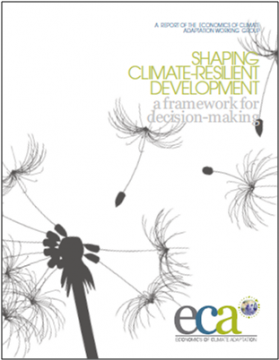Shaping Climate-resilient Development- A framework for decision-making.


Executive Summary
Many national and local economies are already vulnerable to climate events, in the form of floods, droughts, heat waves, and tropical storms. Global warming, which could see the Earth’s surface temperature rise by 2.5-5.9 degrees Celsius by the end of the century compared to preindustrial levels, could greatly heighten this vulnerability, triggering more frequent and severe weather disasters, shifts in rainfall patterns and climate zones, and a rise in sea levels.
Climate adaptation is thus an urgent priority for the custodians of national and local economies, such as finance ministers and mayors. Such decision-makers ask: What is the potential climate-related loss to our economies and societies over the coming decades? How much of that loss can we avert, with what measures? What investment will be required to fund those measures – and will the benefits of that investment outweigh the costs?
The aim of this report is to provide decision-makers with a systematic way of answering these questions. Focusing specifically on the economic aspects of adaptation, it outlines a fact-based risk management approach that national and local leaders can use to understand the impact of climate on their economies – and identify actions to minimize that impact at the lowest cost to society. The report is based on the initial findings of a study by the Economics of Climate Adaptation Working Group, a partnership between the Global Environment Facility, McKinsey & Company, Swiss Re, the Rockefeller Foundation, ClimateWorks Foundation, the European Commission, and Standard Chartered Bank.
Citation
ECA (2009). Shaping Climate-resilient Development a framework for decision-making. A report of the economics of climate Adaptation working group. Economics of Climate Adaptation..
(0) Comments
There is no content